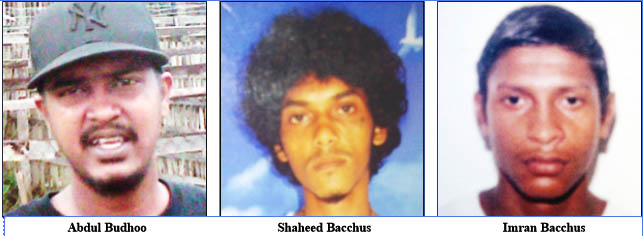Sentenced back in 2017 to 62 years in jail for killing his cousins—brothers Imran and Shaheed Bacchus—Abdul Budhoo in an appeal has contended that the trial judge erred in directing the jury on provocation and that the sentence imposed upon him is severe.
The matter is set for hearing before the Guyana Court of Appeal on November 2nd.
A jury had found Budhoo guilty of murdering Imran, but by a majority of eleven to one, guilty of the lesser count of man-slaughter for unlawfully killing Shaheed.
He was subsequently sentenced by High Court judge Navindra Singh to 32 years in jail on the manslaughter conviction for killing Shaheed and 62 years for the murder of Imran. The sentences were ordered to be served concurrently.
In an appeal filed by his attorney Mark Conway, Budhoo argues that the direction on provocation given by the judge to the jury amounted to a material misdirection which he said may have affected the jury’s verdict.
He contends that the misdirection was to the extent that the jury may have formed a belief that a finding of provocation is impossible where the accused had an intention to kill and therefore such an erroneous belief meant that he (Bacchus) may have been robbed of a possibility of a verdict of manslaughter against Imran Bacchus.
Regarding the issue of sentencing the appellant argues that in accordance with established precedent, he did not receive full credit for time spent in custody prior to sentencing, and rather that this was done at the judge’s discretion.
Budhoo contends that the trial judge’s pronouncement that time on remand is to be deducted at the discretion of the judge, without stating more, does not implement the principles laid down in case law authorities.
On this point he advances that the duty of the judge should have been to state that full credit should be given for any time spent on remand prior to sentencing.
Regarding his 32-year sentence for manslaughter, Budhoo argues that it was unfair and goes against guidelines set out in precedents.
The appellant notes that in imposing this sentence, the judge said he commenced at a base of 30 years to which he added five years for Budhoo’s persistence in the commission of the crime; but then deducted three years for a favourable probation report.
But Budhoo is contending that in accordance with precedent on sentencing guidelines for the lesser offence, a court ought to consider a number of elements, which would then have to be balanced by the court.
Among such factors, and which he outlined the judge did not consider, are the degree of the provocation, the extent and timing of the retaliation, the circumstances of the killing, the relationship between the offender and the victim, the behaviour of the offender after the killing and the type of weapon used.
In the circumstances, Budhoo argues that he was handed a “manifestly excessive sentence.”
The Bacchus brothers were killed on September 30, 2012 at Industrial Area, Mackenzie, Linden.
The prosecution’s facts were that there was an old grievance among the men regarding money, which Budhoo owed to Shaheed.
Investigators had said that on the day in question, Imran and Shaheed were standing on the road awaiting transportation to get to work when their cousin passed by on a bicycle.
According to reports, there was a verbal exchange among them, after which Budhoo went home, and returned on foot. Upon his return, Budhoo continued to verbally engage the brothers, and began throwing bricks at them, even as they pleaded with him to desist.
The prosecutor in the case had said that Shaheed, who observed something bulging in his cousin’s waist, challenged him to “put down wah yuh get on yuh waist, and leh we cuff it out.”
The prosecutor said that it was at this point that the two men got into a scuffle, during which Budhoo whipped out a knife, with which he dealt Shaheed four stab wounds.
The court had heard that Imran, who then intervened to defend his younger brother, was also stabbed by his cousin.
Shaheed died of stab wounds to the lung, compounded by shock and haemorrhage; while Imran died of a stab wound to his heart.





